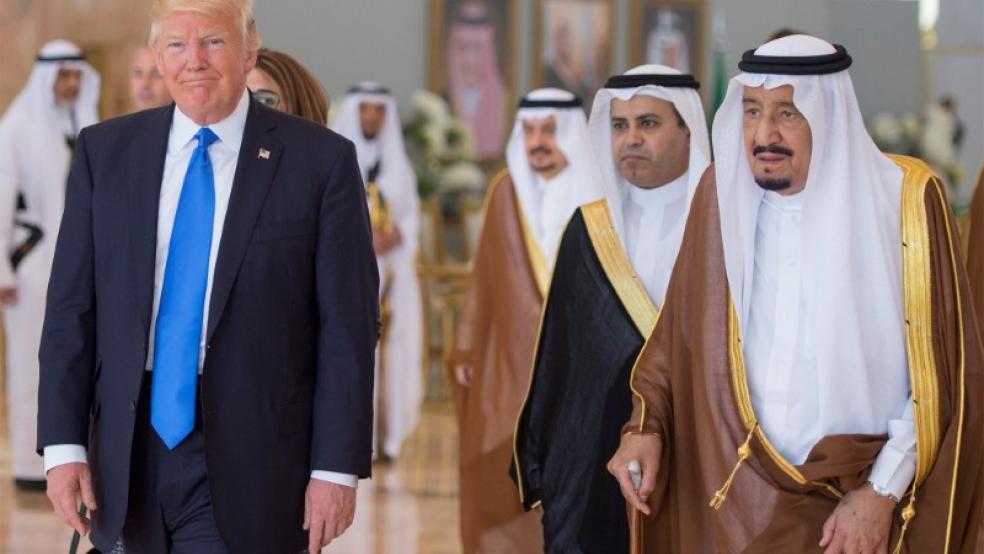President Donald Trump's sharp pivot toward Saudi Arabia has teed up a windfall for American industrial companies and investment firms, but his tacit approval of the kingdom's military exploits may yet cost the United States.
An arms deal with Saudi Arabia worth $110 billion marks a softening of the U.S. position on the Saudi-led coalition in Yemen's civil war, which is widely blamed for a high civilian death toll. Backing Saudi Arabia so stridently — while tabling civil and human rights issues — requires the White House to invest political capital with no guarantee Riyadh will pay a dividend by prioritizing the fight against terror.
Related: Tillerson and McMaster Put Their Credibility on the Line for Trump
To the extent U.S. support prolongs Yemen's war by emboldening the Saudis, the Al Qaeda and Islamic State branches that have exploited Yemen's lawlessness could gain more ground.
To be sure, the Obama administration supported the Saudi-led coalition in Yemen. However, under pressure from U.S. lawmakers and human rights advocates, President Barack Obama blocked some high-value weapons transfers and limited intelligence sharing, especially after a coalition airstrike killed more than 100 Yemenis at a funeral hall in October.
Now, the Trump administration has unequivocally hitched the nation's wagon to Saudi Arabia and its Sunni Muslim allies, Richard Haass, president of the Council on Foreign Relations, told CNBC's "Squawk Box" on Monday.
That position is too one-sided unless Riyadh — an absolute monarchy — changes its behavior, he said. While Shiite Muslim-ruled Iran remains a U.S. and Saudi rival, the White House should acknowledge it is a capable actor with a "real economy," he said.
Related: The New Weapon That Could Make Military Drones Even More Lethal
"I think we've got be careful about in some ways thinking too much of our Sunni partners and not taking Iran seriously enough," he said. "In particular, I would be very wary of getting involved in Yemen, which has all the fixings of a Middle Eastern Vietnam."
The yearslong civil conflict in Yemen came to a head in March 2015 when the Houthis, a Shiite rebel group, overthrew the internationally recognized government. Saudi Arabia soon intervened to prevent the Iran-backed Houthis from consolidating their power on its border.
Two years later, the kingdom finds itself mired in a stalemate, about 10,000 civilians have been killed and a humanitarian crisis is worsening. The Saudi intervention has created an "expensive and endless quagmire" in Yemen, Bruce Riedel, director of the Intelligence Project at the Brookings Institution, wrote this week in an op-ed in Al-Monitor
"The Saudi war effort is dependent upon U.S. support. Congress is increasingly opposed to giving" King Salman bin Abdulaziz Al Saud "and his son a blank check for a war that is causing massive humanitarian damage to the Arab world's poorest country," said Riedel, a Middle East advisor to the last four presidents.
Amnesty International, which has recorded human rights violations by both sides, issued a blistering criticism of the arms deal.
Related: Trump the Diplomat? Will He Charm or Harm US Relations?
"This deal has President Trump throwing gasoline on a house fire and locking the door on his way out," wrote Eric Ferrero, Amnesty International USA communications director.
"There is damning evidence that war crimes have been committed by the Saudi-led coalition and continuing to arm Saudi Arabia fuels serious human rights violations that are causing overwhelming civilian suffering in Yemen."
The conflict has also allowed al-Qaeda in the Arabian Peninsula and, to a lesser extent, the Islamic State to carve out more territory in Yemen.
The White House said the arms deal will bolster "the Kingdom's ability to contribute to counter terrorism operations across the region, reducing the burden on the U.S. military to conduct those operations."
U.S. Commerce Secretary Wilbur Ross said speeches by Middle East leaders during Trump's visit to Saudi Arabia this weekend suggest they are now committed to fighting terrorism.
"Is the bulk of the Islamic world unified with the United States in this effort? This should put that to rest totally," he told CNBC's "Squawk Box" on Monday.
But the International Crisis Group says fighting Islamic extremist groups in Yemen is a secondary concern at best for the Saudi-led coalition. Defeating the Houthis and restoring a Saudi-aligned government remains Riyadh's focus.
"This prioritization, much to the U.S.'s frustration and embarrassment, has facilitated AQAP's efforts to blend in with the anti-Huthi opposition, which has given it access to weapons and new sources of income," the crisis-monitoring nonprofit said in a briefing, using another spelling for Houthis.
In some cases, Ansar al-Sharia — an umbrella organization that includes several al-Qaeda groups — has fought alongside Saudi-aligned forces against the Houthis, the group added.
Reversing gains by Islamist militant groups in Yemen requires ending the conflict, which in turn means securing a political settlement, according to the International Crisis Group. In the meantime, all parties must improve governance on the ground and coordinate with local authorities to use military tools judiciously, it says.
"These efforts will be imperiled if states interested in fighting AQAP and Yemen's nascent Islamic State (IS) branch, such as the U.S., take military actions that ignore the local context and result in high civilian casualties," the group said.
This article originally appeared on CNBC. Read more from CNBC:
White House to pay insurers while Obamacare case kept on ice: Sources
Making these 2 mental shifts in the morning can boost your success all day
Online psychotherapy start-up Talkspace is booming since Trump was elected




